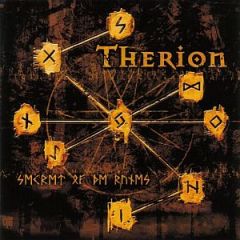Therion - Secret of the Runes (2001)
Therion - Secret of the Runes (2001)

1.Ginnungagap (Prologue) - 6:09
2.Midgård - 5:03
3.Asgård - 4:07
4.Jotunheim - 3:43
5.Schwarzalbenheim - 5:17
6.Ljusalfheim - 3:54
7.Muspelheim - 2:14
8.Nifelheim - 4:35
9.Vanaheim - 4:03
10.Helheim - 3:18
11.Secret of The Runes (Epilogue) - 5:30
12.Crying Days - 4:31
13.Summer Night City - 4:54
The band
Christofer Johnsson: Rhythm guitar, Keyboard, Percussion
Kristian Niemann: Lead guitar, Rhythm guitar
Johan Niemann: Bass guitar
Sami Karppinen: Drums, Percussion
Vocal and string solists:
Marika Schonberg: Solo soprano
Erika Andersson: Solo alto
Carl Rahmqvist: Solo tenor-baritone
Anna Rodell: Solo violin
Asa Akerberg: Solo cello
Thomas Karlsson: Whispering voice
Piotr Wawrzeniuk: Lead vocals
Choir
Kristina Hansson: Coloratura soprano
Anna-Maria Krawe: Soprano
Anna Artursson: Alto
Marika Schonberg: Alto
Henrik Holmberg: Tenor
Patrik Forsman: Tenor
Carl Rahmqvist: Tenor-baritone
Joakim Berg: Bass-baritone
String ensemble
Anna Rodell: Violin (1st)
Josef Cabrales-Alin: Violin (1st)
Malin Samuelsson: Violin (2nd)
Johan Moren: Violin (2nd)
Linda Svedrup: Viola
Niklas Sjunesson: Viola
Asa Akerberg: Cello
Monica Jonsson: Cello
Woodwinds (solo and ensamble)
Fareidah Hildebrand: Flute, Alt flute, Piccolo
Erik Rodell: Oboe, English
Horn Henrik Blixt: Bassoon, Contrabassoon
Brass ensemble
Mikael Sorensen: Trumpet, Fluegelhorn
Ayman Al Fakir: French horn, Wagner tuba
Kristina Borg: French horn
Rune Bodin: Trombone
The concept of this album is based on the ancient Nordic tradition. In this tradition exists a world tree called Yggdrasil. This tree consists of nine worlds on which the album is focused around. The songs describe each of the worlds. However, there are also a prologue and an epilogue. The prologue, "Ginnungagap", is the void of creation, where the world was once shaped. The giant Ymer was slayed and the land was created from his body and the seas of his blood. The epilogue is the title track, which is the quintessence of the whole concept: Odin's journey when he was hanging himself from Yggdrasil fornine days and nights. He then received the knowledge of the runes. The word "rune" (or "runa" as it is called in Swedish) means "secret" and therefore the meaning of the title is "The Secret of the Secrets". The secret hidden in the concept of runes is that they are more than just letters to write with; they are also magical signs and each has an esoteric meaning. Runes have existed in various forms and in different traditions. The Nordic tradition is based on the "Futhark" or more rarely the "Uthark". The Nordic tradition is the most known and today it is basically the only one used among serious occult groups and pagan believers that are using runes; it should not be mixed up with the other existing ones, even though a few of the rune letters in the different rune alphabets may be the same or look a bit similar. The themes Librettos of Richard Wagner were based on the myths and legends from the Nordic-Germanic tradition. Wotan is just another word for Odin. So as the musical influence from Wagner is huge, it is very suitable using related lyrical contents on this album. ---chris, megatherion.com
download (mp3 @192 kbs):
Last Updated (Friday, 15 February 2019 10:55)








